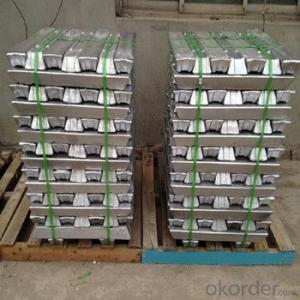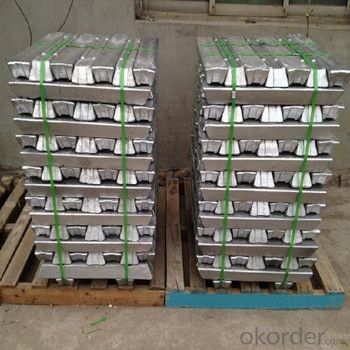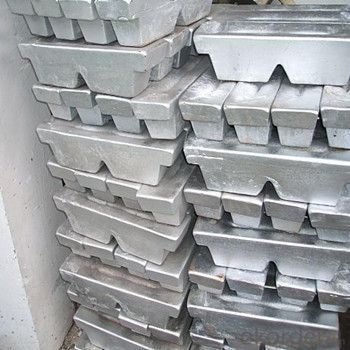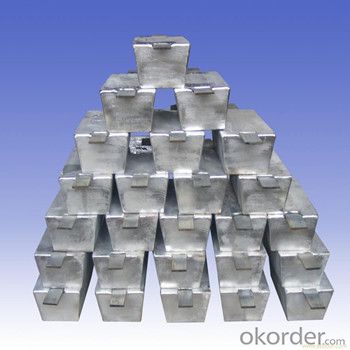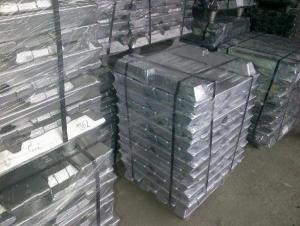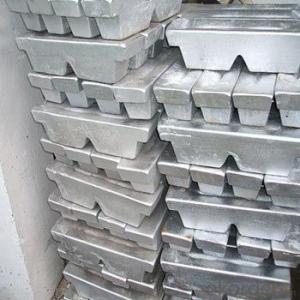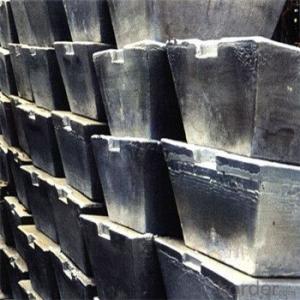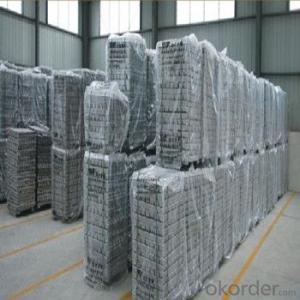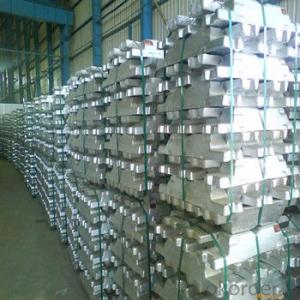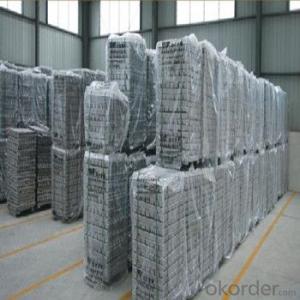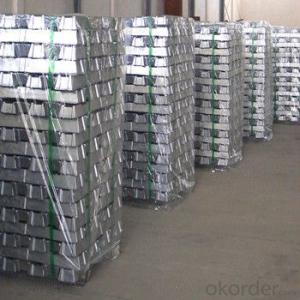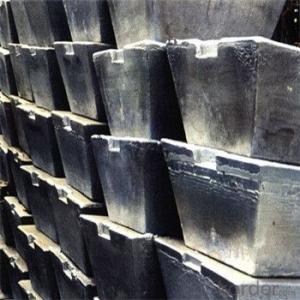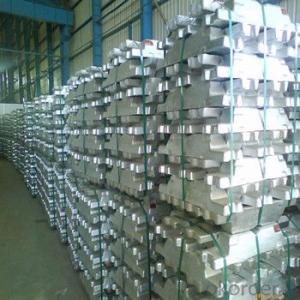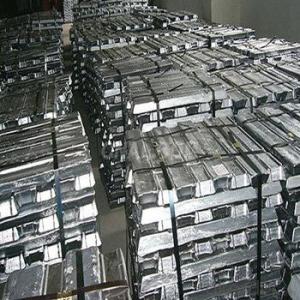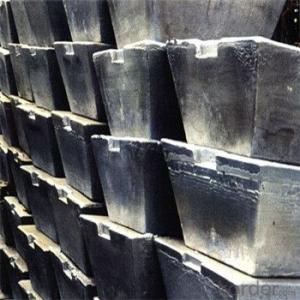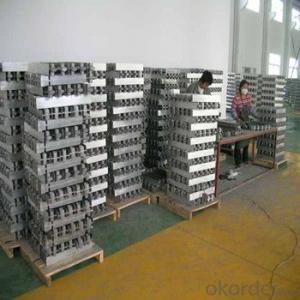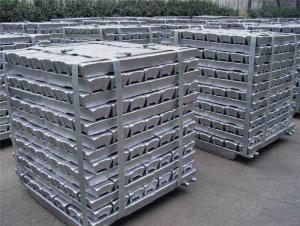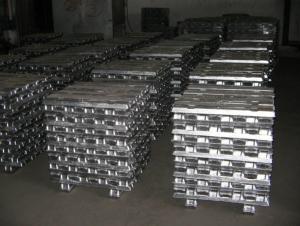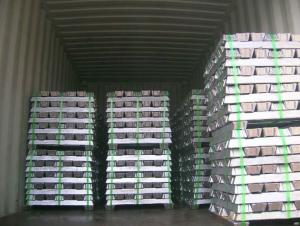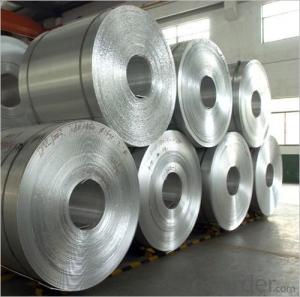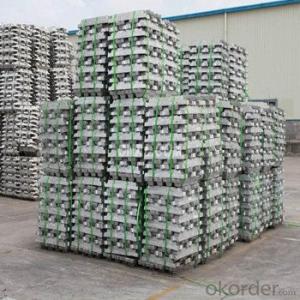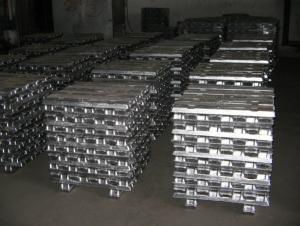Aluminium Ingot from China Hot-Sale with Good Price
- Loading Port:
- China main port
- Payment Terms:
- TT OR LC
- Min Order Qty:
- 1000 m.t.
- Supply Capability:
- 10000 m.t./month
OKorder Service Pledge
OKorder Financial Service
You Might Also Like
Pure Aluminum Ingot Used for Industry
1.Structure of Aluminum Ingot Description
Aluminum Ingot is with the AL as the main chemical composition. Aluminum Ingot is used for industry,such as automobile,pinning and weaving,electron broadly and so on. Aluminum Ingot has the following advantages: easy control and operation, fast melting.
2.Main Features of the Aluminum Ingot
•High Purity
•Easy control and operation
•High strength
•Fast melting
•Competitive price
•Best Service
3. Aluminum Ingot Images
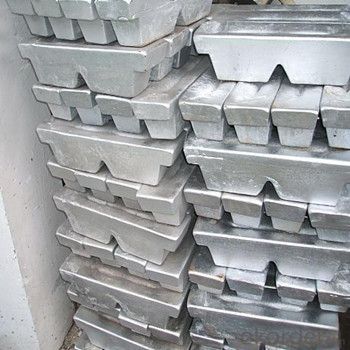
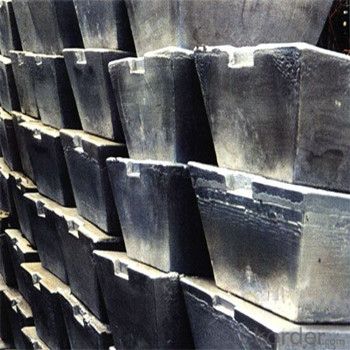
4. Aluminum Ingot Specification
Grade | Chemical Composition % | |||||||||
Al≥ | impurities ≤ | |||||||||
Si | Fe | Cu | Ga | Mg | Zn | Mn | others | Sum | ||
Al99.9 | 99.90 | 0.50 | 0.07 | 0.005 | 0.02 | 0.01 | 0.025 | - | 0.010 | 0.10 |
Al99.85 | 99.85 | 0.80 | 0.12 | 0.005 | 0.03 | 0.02 | 0.030 | - | 0.015 | 0.15 |
Al99.7 | 99.70 | 0.10 | 0.20 | 0.010 | 0.03 | 0.02 | 0.030 | - | 0.030 | 0.30 |
Al99.6 | 99.60 | 0.16 | 0.25 | 0.010 | 0.03 | 0.03 | 0.030 | - | 0.030 | 0.40 |
Al99.5 | 99.50 | 0.22 | 0.30 | 0.020 | 0.03 | 0.05 | 0.050 | - | 0.030 | 0.50 |
Al99.00 | 99.00 | 0.42 | 0.50 | 0.020 | 0.03 | 0.05 | 0.050 | - | 0.050 | 1.00 |
5.FAQ of Aluminum Ingot
We have organized several common questions for our clients,may help you sincerely:
①How about your company?
A world class manufacturer & supplier of castings forging in carbon steel and alloy steel,is one of the large-scale professional investment casting production bases in China,consisting of both casting foundry forging and machining factory. Annually more than 8000 tons Precision casting and forging parts are exported to markets in Europe,America and Japan. OEM casting and forging service available according to customer’s requirements.
②How to guarantee the quality of the products?
We have established the international advanced quality management system,every link from raw material to final product we have strict quality test;We resolutely put an end to unqualified products flowing into the market. At the same time, we will provide necessary follow-up service assurance.
③How long can we receive the product after purchase?
In the purchase of product within three working days, We will arrange the factory delivery as soon as possible. The pecific time of receiving is related to the state and position of customers.Commonly 7 to 10 working days can be served.
- Q: How is an aluminum ingot made?
- An aluminum ingot is made through a process called smelting, which involves heating aluminum ore (bauxite) in a furnace until it melts and becomes molten aluminum. This molten metal is then poured into molds, where it cools and solidifies into the shape of an ingot.
- Q: Can aluminum ingots be used in medical applications?
- Medical applications can utilize aluminum ingots effectively. Aluminum, known for its versatility and advantages in the medical field, offers lightweight properties, corrosion resistance, and excellent thermal conductivity. These qualities make it an optimal choice for a range of medical devices and equipment. Manufacturing medical devices like prosthetics, orthopedic implants, and surgical instruments can utilize aluminum ingots. These ingots can be precisely shaped and sized to meet specific requirements in medical applications. Furthermore, aluminum is commonly employed in the production of medical equipment such as MRI machines, X-ray machines, and dental tools. Moreover, aluminum ingots find use in the production of medical packaging materials. Aluminum foils, with their ability to act as a barrier against moisture, light, and oxygen, are ideal for packaging pharmaceutical products. This ensures the integrity and longevity of medications. It is crucial to emphasize that the utilization of aluminum in medical applications must adhere to strict regulations and guidelines to guarantee patient safety. Manufacturers must rigorously comply with quality control measures and conduct thorough testing to ensure the biocompatibility and safety of the final product. To conclude, aluminum ingots possess favorable properties that make them suitable for various medical applications. Nonetheless, it is essential to prioritize compliance with applicable regulations and standards to ensure the safety and effectiveness of the final medical product.
- Q: What is the process for smelting aluminum ingots?
- The process for smelting aluminum ingots involves several steps. First, bauxite ore, which is the primary source of aluminum, is mined and refined to remove impurities. The refined bauxite is then transformed into alumina through a process called the Bayer process. Next, the alumina is mixed with cryolite and other additives in a large electric furnace. This mixture is heated to extremely high temperatures, reaching around 1,800 degrees Celsius. The intense heat causes the alumina to melt and separate into aluminum and oxygen. The molten aluminum is then tapped from the furnace and transferred to a holding furnace or a ladle. During this stage, the aluminum is often alloyed with other metals to enhance its properties. Common alloying elements include magnesium, silicon, copper, and zinc. Once the desired alloy composition is achieved, the molten aluminum is poured into molds to form ingots. These molds are typically made of steel and can vary in size and shape depending on the specific requirements. After the aluminum has solidified and cooled, the ingots are removed from the molds and undergo further processing, such as heat treatment or rolling, to achieve the desired mechanical properties and shape. Overall, the process of smelting aluminum ingots involves mining and refining bauxite, transforming it into alumina, melting the alumina to separate aluminum and oxygen, alloying the molten aluminum, pouring it into molds, and finally processing the solidified ingots to achieve the desired properties.
- Q: What are the quality standards for aluminum ingots?
- Various organizations and regulatory bodies establish quality standards to ensure the production of high-quality and consistent aluminum products. These standards play a vital role in defining the quality requirements for aluminum ingots. Here are some of the commonly observed quality standards: 1. Chemical Composition: The mechanical properties and suitability of aluminum ingots for specific applications greatly depend on their chemical composition. Quality standards specify acceptable ranges for elements like aluminum, iron, silicon, copper, magnesium, and other impurities. 2. Purity: To ensure minimal impurities and contaminants, aluminum ingots must meet specific purity requirements. Standards usually set limits for impurities such as oxides, alkali metals, and heavy metals to maintain the desired level of purity. 3. Physical Properties: Quality standards also cover various physical properties, including density, tensile strength, elongation, hardness, and thermal conductivity. These properties determine the performance of the ingots in different applications and enable manufacturers to produce consistent and reliable aluminum products. 4. Grain Structure: The mechanical strength and formability of aluminum ingots are influenced by their grain structure. Quality standards define acceptable grain size and uniformity to ensure consistent properties within the ingots. 5. Surface Quality: The surface of aluminum ingots should be free from defects like cracks, voids, porosity, or excessive oxidation. Quality standards specify acceptable limits for these defects to ensure the suitability of the ingots for further processing. 6. Dimensional Tolerances: Standards also establish acceptable dimensional tolerances for aluminum ingots, including length, width, thickness, and weight. These tolerances ensure uniformity and compatibility with downstream manufacturing processes. 7. Packaging and Marking: Quality standards often include guidelines for appropriate packaging and marking of aluminum ingots to prevent physical damage, corrosion, or mix-ups during transportation and storage. It is worth noting that specific quality standards may vary depending on the industry and intended use of the aluminum ingots. Manufacturers and customers should consult relevant standards organizations such as the International Organization for Standardization (ISO) or the American Society for Testing and Materials (ASTM) to ensure compliance with the appropriate quality requirements.
- Q: What are the different shapes and sizes of aluminum ingots?
- The shapes and sizes of aluminum ingots can vary depending on the manufacturing process and intended use. Common shapes include rectangular, cylindrical, and trapezoidal. Sizes can range from small ingots weighing a few pounds to larger ones weighing several tons.
- Q: What are the main factors influencing the choice between aluminum ingots and aluminum castings?
- The main factors influencing the choice between aluminum ingots and aluminum castings are the desired shape and complexity of the final product, manufacturing process efficiency, cost considerations, and the mechanical properties required for the application.
- Q: What are the different surface finishes available for aluminum ingots?
- The different surface finishes available for aluminum ingots include mill finish, brushed finish, anodized finish, powder-coated finish, and polished finish.
- Q: How much is a ton of aluminum now?
- According to the current market situation, the price of silver oxide is about 18500, the price is about 21000 white electrophoresis.
- Q: What is the difference between aluminium ingot and aluminium alloy ingot? Is the broken aluminium standard sold on the market now?
- The so-called aluminum alloy usually refers to contain certain other chemical elements of aluminum, such as common aluminum silicon alloy, aluminum magnesium alloy. ADC-12 is Al Si alloy.
- Q: How can the energy efficiency of aluminum ingot production be improved?
- There are multiple approaches to enhancing the energy efficiency of aluminum ingot production. To start, the implementation of cutting-edge technologies and equipment can yield substantial reductions in energy consumption during the production process. For instance, the utilization of energy-efficient furnaces and heat recovery systems enables the capture and reuse of wasted heat, thereby decreasing the overall energy requirement. Furthermore, optimizing the production process can result in improved energy efficiency. This can involve measures such as minimizing the number of steps, streamlining workflow, and minimizing material losses. By identifying and eliminating any bottlenecks or inefficiencies in the production line, energy consumption can be diminished. In addition, embracing sustainable practices can contribute to energy efficiency. This can entail harnessing renewable sources of energy, like solar or wind power, to generate electricity for the production process. Moreover, implementing energy management systems and conducting regular energy audits can assist in identifying areas where energy consumption can be further reduced. Additionally, recycling and reusing aluminum scrap is a highly effective method of enhancing energy efficiency. By establishing a closed-loop system, where scrap aluminum is collected, melted, and reintroduced into the production process, the energy-intensive extraction and refining processes can be minimized. Lastly, raising employee awareness and fostering engagement can play a pivotal role in improving energy efficiency. Educating the workforce about the significance of energy conservation and providing training on energy-saving practices can cultivate a more energy-conscious work environment. In conclusion, a combination of advanced technologies, process optimization, sustainable practices, recycling, and employee engagement can significantly boost the energy efficiency of aluminum ingot production. By implementing these measures, the industry can reduce energy consumption, lower greenhouse gas emissions, and strive towards a more sustainable future.
Send your message to us
Aluminium Ingot from China Hot-Sale with Good Price
- Loading Port:
- China main port
- Payment Terms:
- TT OR LC
- Min Order Qty:
- 1000 m.t.
- Supply Capability:
- 10000 m.t./month
OKorder Service Pledge
OKorder Financial Service
Similar products
Hot products
Hot Searches
